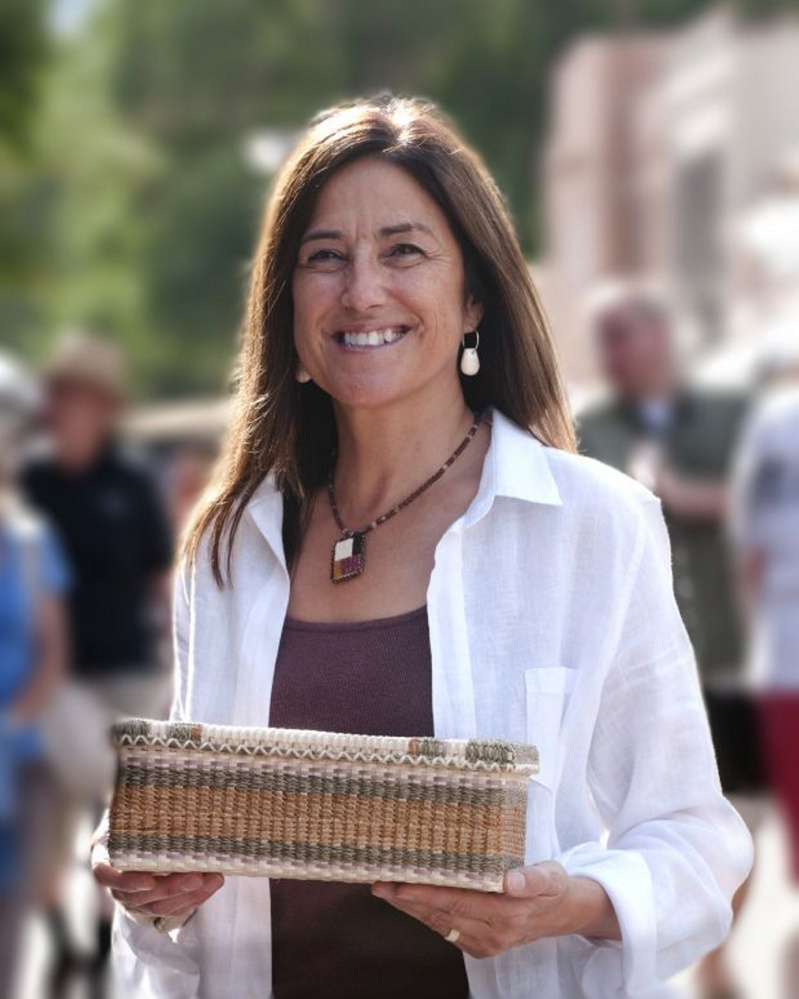A Penobscot basketmaker from Waterville has received the nation’s highest honor in the traditional arts.
Theresa Secord, 58, received a National Heritage Fellowship from the National Endowment for the Arts, one of nine artists who received the award Thursday. The fellowship includes a $25,000 stipend, and Secord will be honored in Washington, D.C., in September.
Past recipients include musicians, boatbuilders, dancers and quilters. More than 400 artists, including a half-dozen Mainers, have won the award. The most famous recipient is the late blues musician B.B. King.
“It’s really a humbling experience,” Secord said by phone Thursday afternoon. “I truly hope I can live up to it. I am just like the average person, thinking, ‘Wow, this can’t be for me.’ ”
Secord received the award because of her skills using ash and sweetgrass to make Indian baskets, as well as for her role in raising the awareness of the Indian basketmaking tradition within her community and the larger world, said Cliff Murphy, the NEA’s director of folk and traditional arts. “She has been a selfless advocate for other people for a long time,” Murphy said.
Secord is founder of the Maine Indian Basketmakers Alliance, which is credited with saving traditional basketmaking in Maine. She learned basketry from elder Penobscot basketmaker Madeline Tomer Shay, who inspired Secord “to save the art form.”
“She was passionate,” Secord said. “She passed that passion down to me.”
A GIFTED ARTIST, TEACHER
Secord was among four Indian artists whose baskets were part of the Portland Museum of Art Biennial last year. It was the first time the museum included Indian basketmakers in the Biennial. The museum’s chief curator, Jessica May, saluted Secord’s win. “We are all thrilled to learn of this important and well-deserved recognition,” May said in a statement. “I think of Theresa as a living treasure; Not only is she a gifted artist, but her commitment to teaching and fostering the historic art of basketry has created a vital new path into the future for so many young people of Native American ancestry who wish to carry their cultural heritage forward into the 21st century.”
Six other Maine artists have previously won the award: Passamaquoddy basketmakers Molly Neptune-Parker, Clara Keezer and Mary Gabriel; traditional wooden boatbuilder Ralph Stanley; Shaker singer Sister Mildred Barker; and fiddler Simon St. Pierre.
Secord’s baskets are different from those of earlier recipients because Secord incorporates alternative materials in her baskets, including cedar and basswood. Generally, sweetgrass and ash are associated with Indian basketmaking. She’s also experimented with different kinds of natural dyes, to introduce new colors, said Julia Gray, director of collections and interpretation at the Abbe Museum in Bar Harbor, which is dedicated to native art and culture in Maine. “The forms of her baskets haven’t changed, but she has expressed her creativity by using different materials and natural colors. She is connected to tradition, and is using new textures and new colors,” Gray said.
Secord, who was born in Portland, uses basket forms, or molds, that she inherited from her great-grandmother. Those molds give shape to her art.
In 1988, she became an early apprentice of the Maine Arts Commission’s traditional arts program. That’s when she began working with Shay, who later inspired Secord to form the Maine Indian Basketmakers Alliance. She became its first director in 1993.
The alliance matches elders with apprentices, and has developed markets in Maine and nationally for traditional and contemporary baskets, said Lori Pourier, president of the South Dakota-based First Peoples Fund, which supports native art and artists. Secord is a former board member.
The alliance has helped lower the average age of Maine basketmakers from 63 to 40, and increased the number of weavers from 55 to more than 200.
“She is mother of the movement on the East Coast around preserving and promoting and passing on basketmaking to the next generation,” Pourier said. “We can see evidence of her work everywhere. Now, we see 20-something-year-olds representing the Northeast region, and that’s a result of Theresa’s work, really listening to the voices of the elders while working to make sure there is marketplace for the next generation of basket-weavers as well.”
‘IT PUTS WIND IN YOUR SAILS’
She’s won many awards for her work, including several first-place awards at the Heard Museum Guild Indian Fair in Arizona and the Santa Fe Indian Market. Secord won the Prize for Creativity in Rural Life from the Women’s World Summit Foundation for helping rural basketmakers improve their lives. In 2011, she won a traditional arts fellowship from the Maine Arts Commission, and was named Maine Master Craft Artist of the Year in 2013.
Julie Richard, executive director of the Maine Arts Commission, said Thursday’s award elevates Secord’s profile, and will bring more attention to Maine’s native traditions.
Cinnamon Catlin-Legutko, director of the Abbe Museum, agreed. “When I see people win an award like this, it puts them in a new echelon of impact, a new regard. It inspires an artist to do more and to innovate. It puts wind in your sails,” she said. “This positions her for a whole new phase of her career.”
Secord wasn’t getting too far ahead of herself. She was traveling from her home in Waterville to visit a friend in Farmington, where they planned a quiet celebration. She was in a reflective mood, remembering her late mother, Mary, and her father, Lawrence, who lives in Scarborough.
“There are other art awards in the nation, other larger monetary fellowships,” she said. “But this award recognizes people like me who have made great efforts to make sure endangered art forms survive, contemporary or traditional. For me and who I am, this is the greatest honor I could receive in my lifetime.”
Send questions/comments to the editors.




